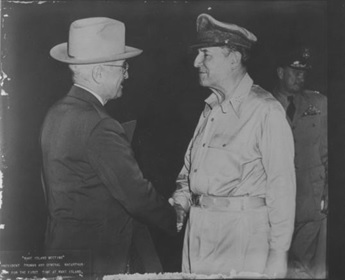Originally posted by QueensburyRules
View Post
McArthur was not a "civilian"when the bomb was dropped,he was the Supreme Commander of the US Forces in the Far East and accepted the Japanese surrender.
Are you seriously saying as the Commander in that theatre of war he was unaware ,in your words "like any other civilian ,that Truman was going to drop the bomb ?
McArthur did not become a civilian until April11 th1951 when Truman fired him for continued direct disobedience.
McArthur wanted to bomb China!
April11th 1951
MacArthur was recalled to active duty in 1941 as commander of United States Army Forces in the Far East. A series of disasters followed, starting with the destruction of his air forces on 8 December 1941 and the Japanese invasion of the Philippines. MacArthur's forces were soon compelled to withdraw to Bataan, where they held out until May 1942. In March 1942, MacArthur, his family and his staff left nearby Corregidor Island in PT boats and escaped to Australia, where MacArthur became supreme commander, Southwest Pacific Area. Upon his arrival, MacArthur gave a speech in which he promised "I shall return" to the Philippines. After more than two years of fighting, he fulfilled that promise. For his defense of the Philippines, MacArthur was awarded the Medal of Honor. He officially accepted the surrender of Japan on 2 September 1945 aboard the USS Missouri, which was anchored in Tokyo Bay, and he oversaw the occupation of Japan from 1945 to 1951. As the effective ruler of Japan, he oversaw sweeping economic, political and social changes. He led the United Nations Command in the Korean War with initial success; however, the invasion of North Korea provoked the Chinese, causing a series of major defeats. MacArthur was contentiously removed from command by President Harry S. Truman on 11 April 1951.
The Firing of MacArthur
 Background
BackgroundIn 1945, the scars of World War II across the world were still fresh. The fear of having to engage in another world war was very real. A mere two years after the end of WWII, the Cold War began. The United Nations, which was formed to provide a forum to prevent future wars, included the membership of the Soviet Union, the United States, the United Kingdom and 57 other countries. The US adopted a firm stance to contain the spread of communism, which was being aggressively promoted by the USSR.
The Korean War began when the North Korean People’s Army (NKPA) crossed the 38th parallel into South Korea. Adhering to its policy of containment, the United States could not ignore the threat of communism in Asia, but neither the president nor the public wanted a long, drawn out war. President Truman hand selected General Douglas MacArthur to lead the U.S. troops in South Korea. MacArthur arrived at his post a World War II hero, having successfully led multiple troops through the war. Following his victories in WWII he had become the Supreme Commander for the Allied Powers in Japan. MacArthur was revered and highly praised in the United States.
The general assured the president that the Korean War would be short-lived and that the American troops would be home by Christmas. MacArthur was initially successful in driving back the North Korean forces over the 38th parallel. He made a controversial move, however, when he continued to push the North Koreans further north and suggested bombing cities in China that were thought to be aiding the North Korean troops. In pushing for a larger conflict, MacArthur downplayed the risk of inciting a massive war in Asia.
President Truman’s main concern was saving as many lives as possible, even if that meant signing a ceasefire along the 38th parallel. General MacArthur did not think a ceasefire was an appropriate solution. The two men clashed. For Truman, the war represented an opportunity to stop the spread of communism into South Korea. For MacArthur, the war was an opportunity to liberate the North from communist control, and aggressive action was required.
MacArthur thwarted Truman’s attempt to negotiate a ceasefire when the general ordered his troops to invade North Korea and push the NKPA up past the 38th parallel. This was not the first time the general had ignored direct orders from his Commander in Chief. On April 11, 1951, President Truman officially relieved Douglas MacArthur of his command. Word of his firing spread quickly, and the American public found the news upsetting. Truman felt that his decision was just because MacArthur had overstepped his authority, defied direct orders from his superior and interfered with Truman’s hope of ending the Korean War quickly.
PS.You can get off your cushion now! lol






Comment